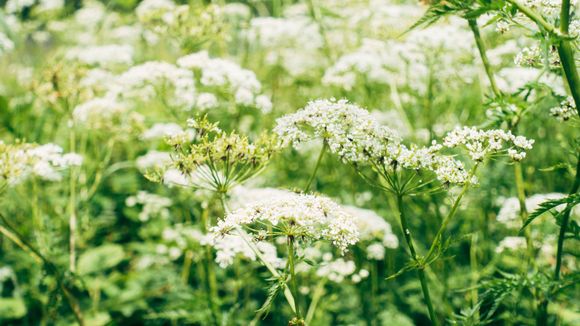What is yarrow (Achillea millefolium)
Yarrow (Achillea Millefolium) is a common perennial wild flower that usually grows in pastures, by the roads and even in desolate places. [ref. 1] There are long fragrant leaves and flat white colored heads that are attractive to a wide range of pollinators, especially flies.
Achillea millefolium is a highly variable species - it is treated both as a species with varieties and as many different species. A. millefolium is found throughout the Northern Hemisphere. In North America, for example, A. millefolium is a complex of native and introduced plants and their hybrids.
The yarrow contains phytochemicals, which can help stop stomach cramps and fight infections. [ref. 2] People often use yarrow in problems such as eczema, irritable colon syndrome (IBS), wound healing and many other conditions, but not all of them have sufficient scientific evidence.
Benefits and Uses of Yarrow Herb (Achillea millefolium)
Achillea spp. is well known for its wide range of applications and its long history of use in traditional medicine around the world. The health benefits of Achillea extracts are the result of the numerous secondary metabolites identified in plants of this genus, which include flavonoids, phenolic acids, terpenes, guayanolydes, phytosterols, fatty acids and organic acids. Several extracts and isolated compounds from Achillea millefolium also show significant inhibitory, antioxidant and antimicrobial properties of tyrosinase and thus are interesting candidates for active ingredients of drugs and cosmetic products protecting the skin. There are studies that also reveal anti-inflammatory potential in local application of the herb. [ref. 3]
Next, we will consider the benefits and applications of yarrow tea, which extend from support wound healing, to anti-inflammatory action in the body.
Yarrow for wound healing
Since the time of Ancient Greece, yarrow has been used in paws and ointments to treat wounds. An animal study found that yarrow leaf extracts show anti-inflammatory and antioxidant properties, both of which help heal wounds. [ref. 4] Indians and early settlers used yarrow because of its bloodsucking action, which makes it an effective remedy for wound healing.
Yarrow to relieve digestive problems
Yarrow has long been used to treat digestive problems such as ulcers and irritable bowel syndrome (IBS), whose symptoms include stomach pain, diarrhea, bloating and constipation. In fact, this herb contains several flavonoids and alkaloids, which are plant compounds known to alleviate digestive complaints.
In a study in rats, tonic with yarrow extract protects against damage to gastric acid and demonstrates anti-ulceration properties. [Ref. 5]
Another animal study found that flavonoid antioxidants in yarrow tea can fight digestive cramps, inflammation and other symptoms of IBS. [Ref. 6]
Yarrow to reduce symptoms of depression and anxiety
Flavonoids and alkaloids in yarrow tea can alleviate symptoms of depression and anxiety, as indicated in several studies. [ref. 7] Studies have shown that plant-based alkaloids such as those in yarrow tea reduce secretion of corticosteroid, a hormone that is high during chronic stress.
Yarrow against inflammation
While inflammation is a natural bodily response, chronic inflammation can lead to damage to cells, tissues and organs in the human body. Yarrow can reduce inflammation of the skin and liver, which can help treat skin infections, signs of skin aging and non-alcoholic fatty liver disease. [Ref. 8]










